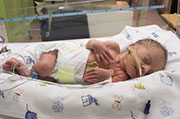- FDA Approves New Antibiotic Against UTIs
- New School Lunch Rules Target Added Sugars, Salt
- Dairy Cows Moved Across State Lines Must Now Be Tested for Bird Flu
- TikTok Riddled With Misleading Info on Health: Study
- Emulsifier Chemicals Are Everywhere in Foods. Could They Raise Diabetes Risk?
- Opioids During Pregnancy May Not Raise Psychiatric Risks for Offspring
- Could Heartburn Meds Raise Your Migraine Risk?
- Drug, Alcohol Abuse Goes Untreated in Many Ex-Prisoners
- Watchdog Group Says U.S. Food Recalls Rose Again Last Year
- Genes Could Mix With Pesticide Exposure to Raise Parkinson’s Risk
Brain Chemicals May Signal Which Preemies Will Have Delays


A potential new way to identify premature infants at high risk for delays in motor skills development may have been discovered by researchers.
The researchers conducted brain scans on 43 infants in the United Kingdom who were born at less than 32 weeks’ gestation and admitted to a neonatal intensive care unit (NICU). The scans focused on the brain’s white matter, which is especially fragile in newborns and at risk for injury. They also conducted tests that measured certain brain chemical levels.
When 40 of the infants were evaluated a year later, 15 had signs of motor problems, according to the study published online Dec. 17 in the journal Radiology. Motor skills are typically described as the precise movement of muscles or groups of muscles to perform a certain act.
The researchers determined that ratios of particular brain chemicals at birth can help predict motor-skill problems. Specifically, increased choline/creatine and decreased N-acetylaspartate/choline were 70 percent accurate in predicting which babies would have motor development delays one year later.
Being able to predict the risk of neurodevelopmental problems in premature babies would help identify those who should receive intensive treatment, and also prove useful in assessing the effectiveness of those therapies, according to study author Giles Kendall of University College London.
Physical therapy is available but very expensive, and the vast majority of premature babies don’t need it, he said. “Our hope is to find a robust biomarker that we can use as an outcome measure so that we don’t have to wait five or six years to see if an intervention has worked,” he said in a journal news release.
Severe disability associated with premature birth has decreased over the past two decades as a result of improved care in NICUs. But many premature infants still have subtle problems that can be difficult to detect, Kendall noted.
“There’s a general shift away from simply ensuring the survival of these infants to how to give them the best quality of life. Our research is part of an effort to improve the outcomes for prematurely born infants and to identify earlier which babies are at greater risk,” he said.
More information
The American Academy of Pediatrics has more about premature babies.
Source: HealthDay
Copyright © 2024 HealthDay. All rights reserved.










